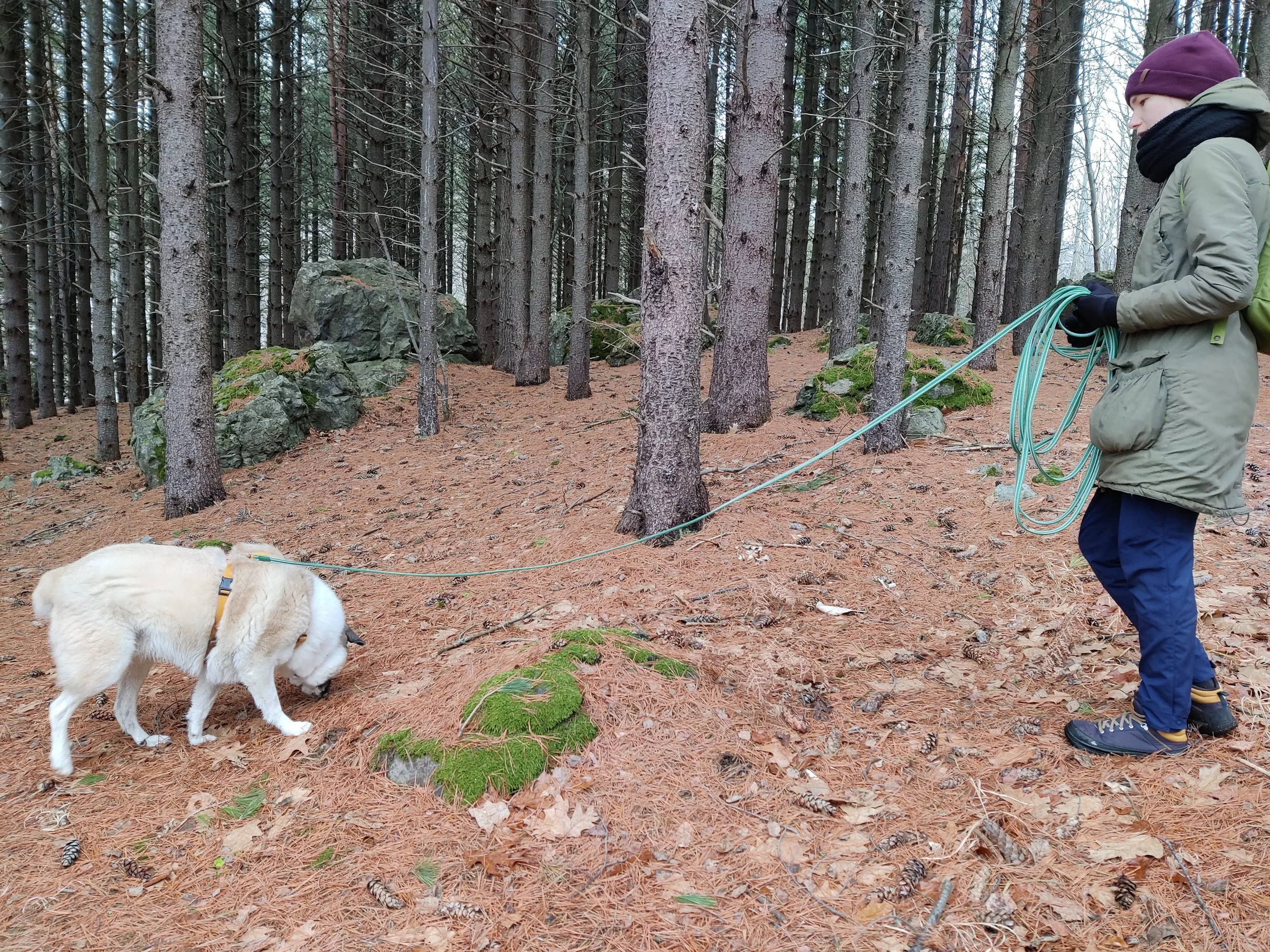Long Walks On The Weekends?
Many caretakers take their dogs for long walks or hikes on the weekends. Finally, we have some more time to enjoy a walk in nature with our four legged friends. What can be wrong about that?
As always, looking at things from the dog’s perspective can reveal something interesting!
In this article we want to mostly touch on the physical aspect and will discuss the picture we most often observe. However, we should note that physical health is greatly connected to behaviour and mental wellbeing.
From Monday to Friday most dogs tend to go on a couple of shorter walks a day with big breaks (and hopefully a couple of toilet exits) in between. In many cases, those walks are on leash and slower in pace.
In addition, these walks usually happen in the neighbourhood, where the terrain is mostly flat.
Then carers take their dogs to a longer walk during the weekend and their body suddenly gets a whole different type of exercise:
Longer walks, sometimes several hours long
Faster paced
Commonly off leash
On varied terrain (forest, mountains, beach, etc)
And did we think about warming up or did we let our dog jump from the car and off she goes?
Let's consider what impact it can have on our dogs’ bodies:
Suddenly, the body gets loaded with an amount of exercise that it is not prepared for. Dogs overheat easily and go into anaerobic exercise, which creates stress for the whole body.
With running, jumping and climbing micro-traumas may easily happen on an unprepared body. The micro-traumas heal, of course, but the scar tissue accumulating in time may cause further issues in the body.
Many dogs already struggle with mobility issues, which long weekend walks / hikes exacerbate as the body that is not in balance gets overloaded.
The impact is that much stronger for dogs that spend a lot of time in crates and do not have opportunities to move around and stretch when they would choose to.
Long weekend walks are also especially dangerous for puppies and their growing, fragile bodies. The same often goes for dogs that have been recently adopted from shelters, because they likely have not developed the right muscles yet.
How can we take care of our dog’s health and muscular-skeletal system?
From studying the ethogram (list of natural behaviours) of free ranging dogs we know that dogs choose to spend most of their day resting and sleeping. And when they move around, it's usually not a lot and not far away from their usual resting place. In addition, free-ranging dogs mainly choose to walk, not run.
This gives us a good idea of what kind of exercise is more beneficial for our dogs and closer to their species ethogram. The pet dogs’ ethogram is affected by us, humans, but they are the same species as free ranging dogs, and the latter can teach us a lot about what is good and natural for dogs. They are very good at coping with challenges in their environment, and, most interestingly, do not have behavioural issues that we so often see in pet dogs.
Therefore, avoiding very long walks and hikes is a good idea. 40 min - 1 hour long walk a day with lots of stops for sniffing is usually enough for a healthy adult dog.
Walks should be much shorter for puppies, recently rescued dogs and dogs with mobility issues.
If we really want to take a very long walk or go hiking, we can do that without our dogs, can't we?
Of course, we still want to enjoy nature outings with our fourlegged companions. It's a great idea to allow off leash times and take your dog to places with varied terrain. Natural movement develops proprioception and deep stability muscles.
We can just keep such walks shorter and make stops to rest along the way.
Learn about natural agility in this post.
We can also start and finish our walks in nature by slowly walking with the dog on leash for a few minutes. That will allow dogs' muscles to warm up and be better prepared for exercise and then cool down after the walk.
Another way to cool down the body nicely is to offer a simple treat search. A treat search allows the neck and back muscles to stretch in a gentle way and to slow down the pulse.
The walk doesn’t finish when we stop the activity. Cooling down in a gentle way is important from the dogs’ body perspective and to avoid injuries during future walks.
A moderate hike with plenty of breaks may be appropriate for some (physically and mentally) healthy adult dogs, but not all! It is important to make sure that the benefits to the dog outweigh the cost.
If we are planning a faster activity like mantrailing or a slightly longer walk - we can then make sure dogs get a few days of rest with either no walks at all or much slower and shorter walks. Just like us people would like to do.
And certainly, avoiding crating and/or restricting the movement of our dogs does a great favour to their physical (and mental) health. It's crucial that dogs have the opportunity to move around, change sleeping places and stretch by their own choice.
Want to know more on what is a good walk with your dog? 🎞 Watch our talk on the topic here.
Thank you for reaching the end of this article, we wish you happy and healthy walking!



